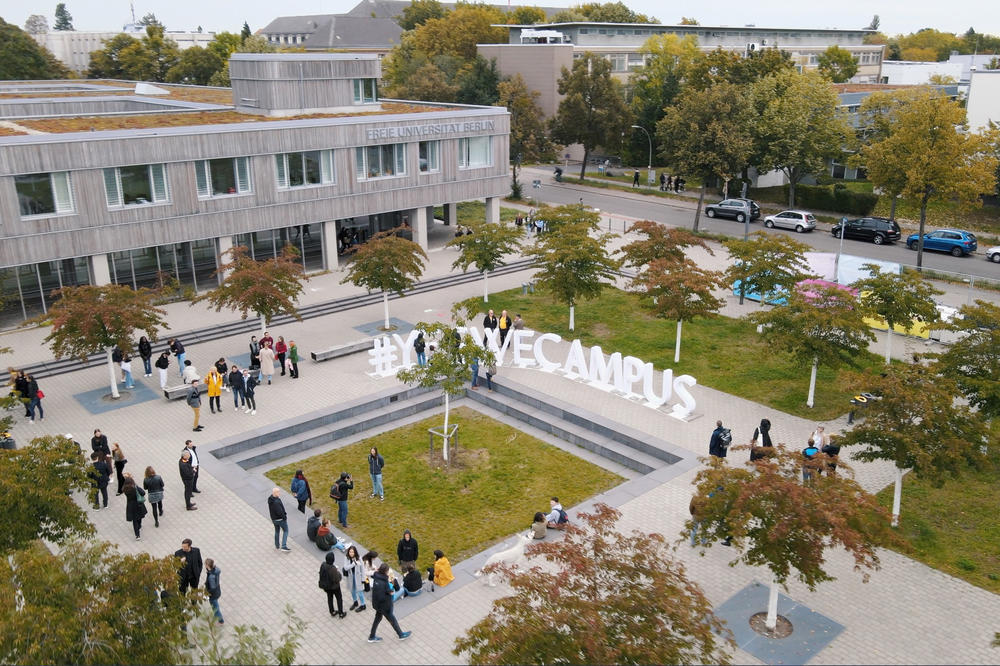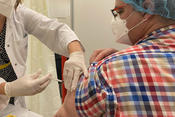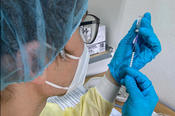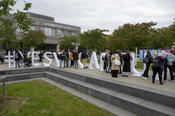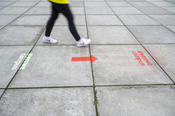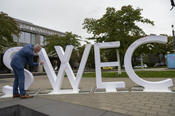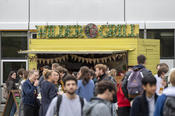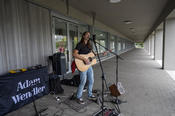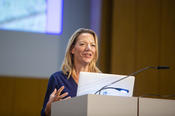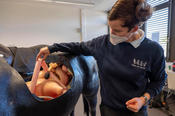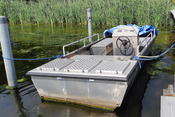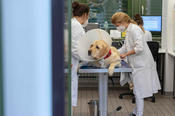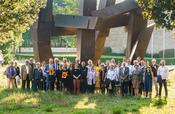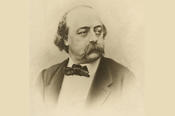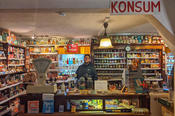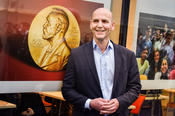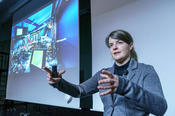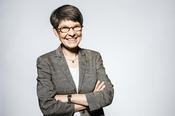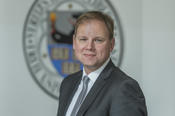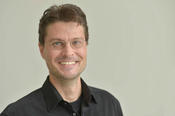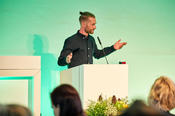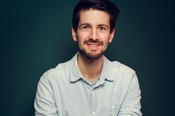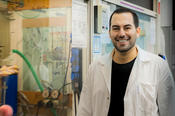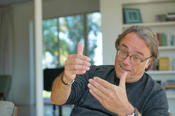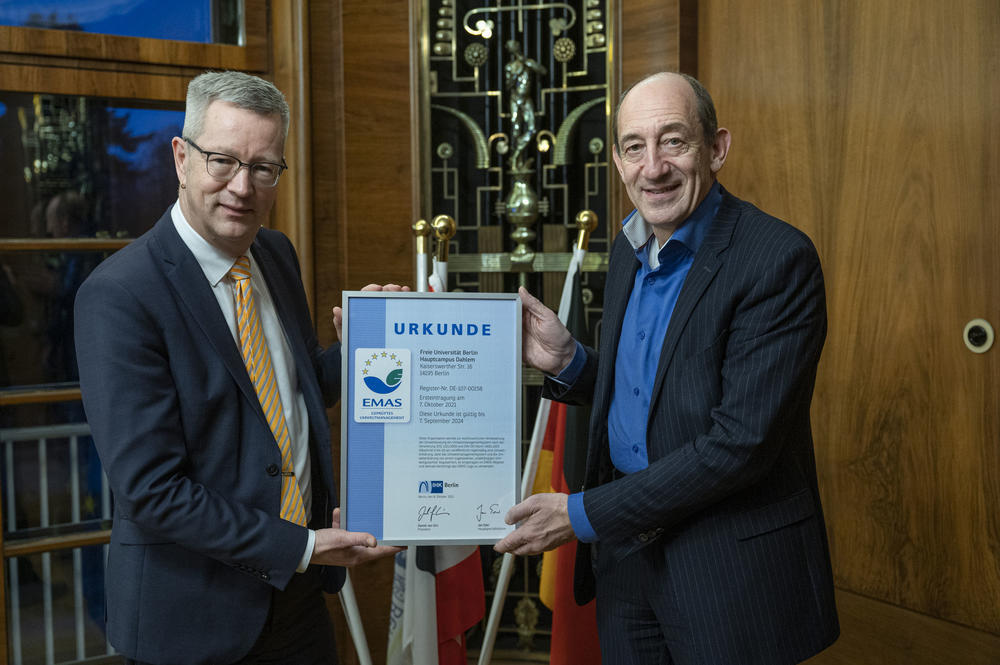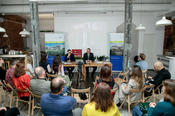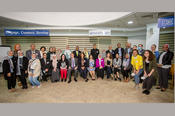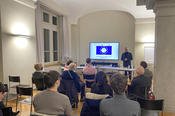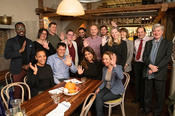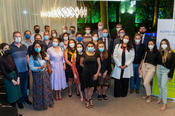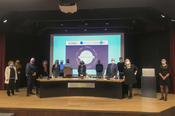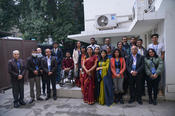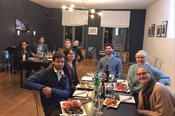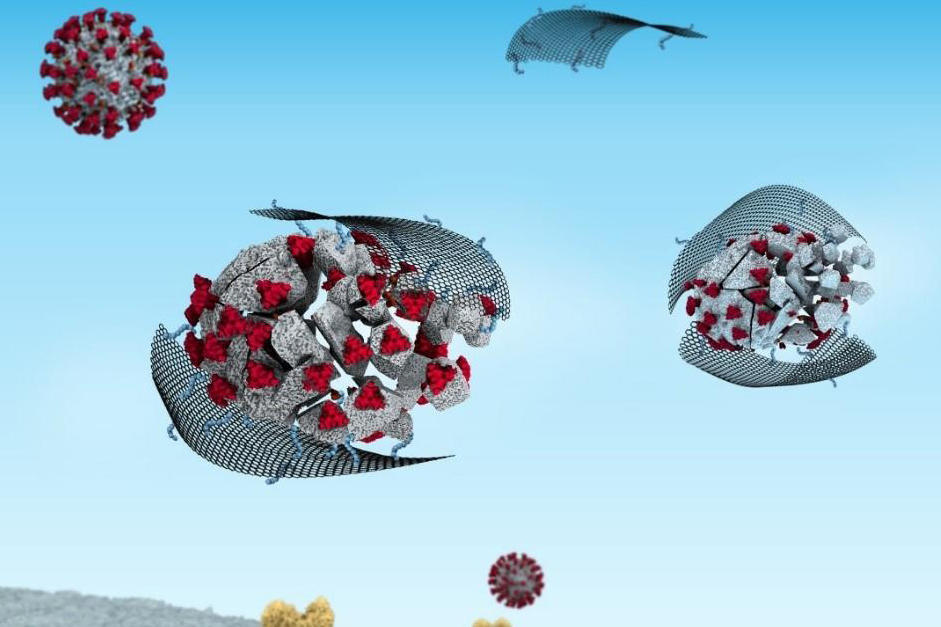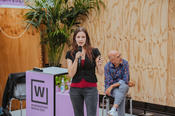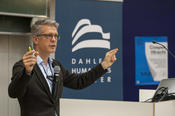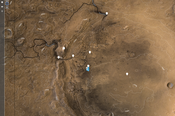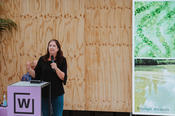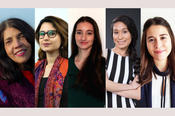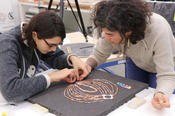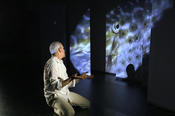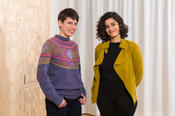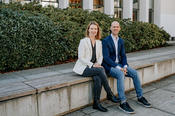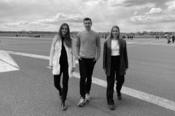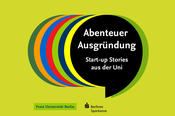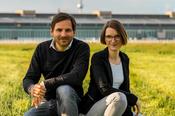New Ideas, Enduring Dedication, and a Strong Sense of Responsibility: Looking Back on 2021 at Freie Universität Berlin
The pandemic and measures to combat it determined the course of another year – Freie Universität Berlin was able to cautiously ease back into on-site operations during the winter semester
Jan 13, 2022
Trust and optimism: The return to campus at the beginning of October was kicked off with a week of activities inspired by the motto #yeswecampus to welcome students to the winter semester.
Image Credit: Björn Kral
“A year unlike any other” was what we were saying this time last year as we looked back over 2020. Who would have thought it would ring true again for 2021? The coronavirus pandemic has been going on for almost two years now and has had serious consequences for children, adolescents, and young adults – and unfortunately its impact doesn’t seem like it will lessen any time soon.
How has the pandemic affected students? How does it feel for them to have their shared apartment transform from mere living quarters into a lecture hall, classroom, cafeteria, and library all in one? What is it like to only be able to go to class, study with friends, or talk with professors using electronic devices?
Last spring, a group of students from the Department of Philosophy and Humanities at Freie Universität wanted to find out the answers to these and other questions from their classmates in a survey. The responses they received painted a rather bleak picture, with reports of lacking motivation, loneliness, and financial struggles. Some of these same issues were addressed in February by Germany’s Federal President Frank-Walter Steinmeier when he spoke with students from around the country, including several students from Freie Universität.
Responding Responsibly Together
“Responding responsibly together” has become another important motto for Freie Universität. In June, a vaccination point opened up directly on campus. Over the summer months, they were able to provide around 8,500 vaccines of BioNTech/Pfizer and Moderna to university employees and students. In December, vaccination appointments were made available on campus again for employees and students of Freie Universität. In the weeks leading up to Christmas, they provided 1,500 vaccines for people needing their first or second shots as well as boosters.
In order to return to campus and teaching on site, the university had to make sure that a sufficient number of students had been fully vaccinated by the start of the 2021/2022 winter semester. The #yeswecampus week came as a welcome change and gave people the opportunity to meet up in person. During the week, Freie Universität invited students to the square outside the Holzlaube building to get to know their place of study. It was a new experience not only for first semester students, but also for those who, because of the pandemic, hadn’t set foot on campus since beginning their studies.
With the so-called “3G rule” in place – and the continued use of masks indoors – the university was able to hold more on-site courses. Computer science professor Lutz Prechelt even developed a web app called “a.nwesen.de” that helps document attendance and track infections.
Unfortunately, not all students and instructors were able to return to the lecture halls and seminar rooms. But the university provided technical support to enable hybrid teaching. Staff from ZEDAT and the University Library’s support office for education and teaching worked together to provide live streams and recordings of lectures and other events. Video conference technology has also been installed in different rooms around campus that can be used for teaching, research, or administrative tasks.
Big Developments Kept the University Busy
Freie Universität revoked Franziska Giffey’s doctoral degree and retracted the reprimand it issued in October 2019. Giffey was the Federal Minister for Family Affairs at the time. The decision by the university’s Executive Board followed the recommendation put forth by the review committee, based in turn on Section 34 of the Berlin Higher Education Act.
At a public informational event in February, Freie Universität provided an update on investigations into human remains found on the grounds of Freie Universität. The event was co-organized with the Max Planck Society and the Berlin Monument Authority. In 2014, fragments of human bones were found during construction work outside the University Library of Freie Universität Berlin, on the premises of the former Kaiser Wilhelm Institute of Anthropology, Human Heredity, and Eugenics (KWIA).
The university continued to work on its strategic planning process “Teaching and Education in 2030” that began in 2020. Two wrap-up events were held, one in the summer and one in the fall, during which seventeen focus groups discussed goals and specific measures related to shaping the university’s education strategy. The focus groups included university members from all across campus. On July 14, the Academic Senate of Freie Universität approved the Mission Statement for Teaching and Learning. But that was not the end of the strategic planning process, as improving education is an ongoing endeavor. At the end of November, the university held a week of activities devoted to putting the mission statement into action and thinking about what makes for quality education both during and after the pandemic. It was another chance for people to actively get involved in implementing the mission statement in concrete ways.
Good research practice is a topic that concerns all universities and research institutions. In order to strengthen the everyday importance of the principles of good research practice at Freie Universität, a central ombudsperson was appointed. Physics professor Joachim Heberle now holds this position. The academic departments also have their own individual ombudspeople.
Freie Universität also approved its Diversity Strategy and Action Plan that lays out goals and measures related to the issue of diversity. Over the next two years, Freie Universität Berlin is also participating in the audit “Shaping Diversity” (“Vielfalt Gestalten”) carried out by the Stifterverband association.
Unique Perspectives on Campus and Beyond
A serious commitment to animal care and welfare: Freie Universität’s small animal clinic provides twenty-four-hour care for sick pets, seven days a week, thanks to the dedication of its team of veterinarians. Veterinary students learning about emergency animal care gain valuable experience online and through the use of life-size models of animals. This training adheres to the 3R principle of “Replacement, Reduction, and Refinement” when it comes to animal testing.
Marine biologist Antje Boetius held the twentieth annual Einstein Lecture at Freie Universität. Her lecture “Of Humans and the Sea: What Connects Us to the Oceans and Polar Regions” took place on October 19, 2021.
The Berlin University Alliance, the consortium made up of Freie Universität Berlin, Humboldt-Universität, Technische Universität, and Charité – Universitätsmedizin Berlin, started offering cross-listed educational opportunities in 2021 for the summer semester. The idea is to encourage tutorials and research teams initiated and led by students and the next generation of scholars and researchers.
Freie Universität law students Samantha Hiltmann and Pia Johnson devote their time and energy to providing free legal advice to fellow students through the not-for-profit organization “Law and Legal.”
In April, the University Sports Center acquired a special e-boat as a new addition to its fleet of water education vessels. The central facility of Freie Universität received a sustainability award for their innovative initiative.
Anniversaries, Jubilees, Commemorations
On the occasion of its 150th anniversary, the Federal Institute for Materials Research and Testing (BAM), together with Freie Universität’s Department of Earth Sciences and Department of Biology, Chemistry, Pharmacy, organized a lecture series titled “Science with Impact.” Anna Gorbushina, a professor of microbiology at Freie Universität and vice president of BAM was responsible for initiating the series.
The ten-year anniversary of the Deutschlandstipendium program was celebrated by scholarship recipients and donors with a digital conference and an in-person campus tour that guided them through the past and present of Freie Universität.
August 13, 2021, marked the sixtieth anniversary of the erection of the Berlin Wall. Researchers and students from Freie Universität organized an exhibit in commemoration of the event.
2021 also marked the two hundredth birthday of French author Gustav Flaubert. He wrote many works that dealt with life in provincial France – something that contemporary French literature continues to explore. Romance language scholars and political scientists at Freie Universität are working on research related to this topic.
Awards
Freie Universität Berlin still ranks among the top six universities in Germany in terms of research. In October, it also received recognition for promoting equity with a TOTAL E-QUALITY Award and an accompanying seal especially for diversity. In December, Freie Unversität was also recognized for its outstanding environmental performance with the Eco Management and Audit Scheme (EMAS) seal of approval.
Ernst Reuter Day and Alumni Gatherings around the Globe
Freie Universität commemorates its founding with the celebration of Ernst Reuter Day, which takes place annually in December. To mark its seventy-third birthday, the university invited science journalist Ranga Yogeshwar to hold a keynote speech on December 3, 2021.
As part of this year’s Ernst Reuter Day celebrations, alumni of Freie Universität gathered together around the world for the first “Worldwide Alumni Celebrations.” The project received support from the German Academic Exchange Service (DAAD). The events included a discussion of the topic “Post:Corona | Transformation in Higher Education.”
From Membrane Envelopes to Gender Roles: Research on and around Covid-19
The development of electrostatic and hydrophobic materials plays an important role in disrupting the membranes of viruses, such as the coronavirus. They can even help protect healthy cells from infection.
Image Credit: Ievgen S. Donskyi
Researchers at the Institute of Chemistry and Biochemistry were successful in producing materials that destroy the membrane envelopes of Covid-19 particles.
How does a Covid-19 infection lead to potential lung damage? Researchers from Charité – Universitätsmedizin Berlin, the Max Delbrück Center for Molecular Medicine (MDC), and Freie Universität Berlin studied the cellular mechanisms involved in lung injury caused by a SARS-CoV-2 infection. They discovered that inflammatory processes affecting the endothelial cells in the lungs appear to play a crucial role in whether an infection becomes severe.
The psychological impact of health and safety measures related to the pandemic for people living in Berlin was investigated by a team from the Berlin University Alliance, with researchers from the Max Planck Society, Freie Universität, Humboldt Universität, Technische Universität, and Charité, as part of the CovSocial project.
In light of schools and daycares closing in response to the pandemic, gender roles have undergone a shift over the last couple of years. In former West German regions, fathers appeared to revert to more “traditional” roles that would have seemed rather outdated before the pandemic. The study was conducted by researchers from DIW Berlin (the German Institute for Economic Research) and Freie Universität.
World-Class International Research
On February 18, 2021, NASA’s Perseverance rover landed on Mars after its launch into space the previous year. People who are interested in seeing what Mars looks like up close can do so thanks to an interactive map developed by researchers from the Planetary Sciences and Remote Sensing Group at Freie Universität Berlin. The map shows where the rover landed in the Jezero Crater and a nearby ancient river delta.
As part of a four-year project, researchers from Freie Universität, the Georg Eckert Institute, and the Protestant Academies in Germany are examining historical and contemporary Christian-religious elements of antisemitism.
An international team of researchers, including archaeologists from the Institute of Ancient Near Eastern Archaeology at Freie Universität Berlin, evaluated and reconstructed the finds from a 9000-year-old grave. During excavations in 2018, they found the richly decorated grave of an eight- to ten-year-old child in Ba`ja in the south of what is now Jordan.
With the help of computer simulations, researchers from Vienna University of Technology and Freie Universität Berlin were able to show how quantum fields can be used to produce record-breaking low temperatures.
In an article authored by physicist Niklas Boers, researchers showed that a major Atlantic Ocean current, which includes the Gulf Stream, may have lost stability over the course of the last century. The Atlantic Meridional Overturning Circulation transports warm and cold water masses and influences weather systems worldwide. A potential collapse of this ocean current system could have severe consequences.
Competitive Start-ups and Innovative Inventions
In 2021 Freie Universität Berlin received its 100th and 101st EXIST Business Start-up Grants, making it the most successful university in this funding program apart from technical university applicants. The grants were awarded to the start-ups “recoupling” and “aureka.” “Recoupling” developed a coaching app that helps couples work on relationship problems. “Aureka.ai” uses artificial intelligence to process audiovisual media in order to help people find results faster when working with audiovisual archives.
Maria Enge and Benjamin Pardowitz developed an electric mobility device for children with severe physical disabilities, which they named “RooWalk.” Psychologist Janina Krassa and her team are working on “YouCan!,” an app for young people with cancer to help them through the treatment process.
In the Berlin-Brandenburg Business Plan Competition (Businessplan-Wettbewerb, BPW), the start-up company Carbon Instead, a Freie Universität Berlin spin-off, won one of two first place prizes. The start-up was selected for its development of a cleaning technique that uses an environmentally friendly additive, “pyrochar,” that can partially replace cement in construction work.
Samantha Lattof and Philip Meier developed a digital health assistant: the app “Maila Health,” which allows pregnant people to calculate their personal risk of certain complications. The app draws from an individual’s personal health data, such as their blood pressure values, and provides the pregnant person with personalized information about potential complications related to blood pressure, for example.
As part of Profund Innovation’s celebration of its fifteenth anniversary in May and June, the support service produced a podcast series, called “Start-up Adventures.” Profund Innovation is a service office within the research division of Freie Universität. They support students, scholars, scientists, researchers, and alumni in developing ideas for practical applications of their research findings, starting a business, or commercializing research results in cooperation with other businesses.

